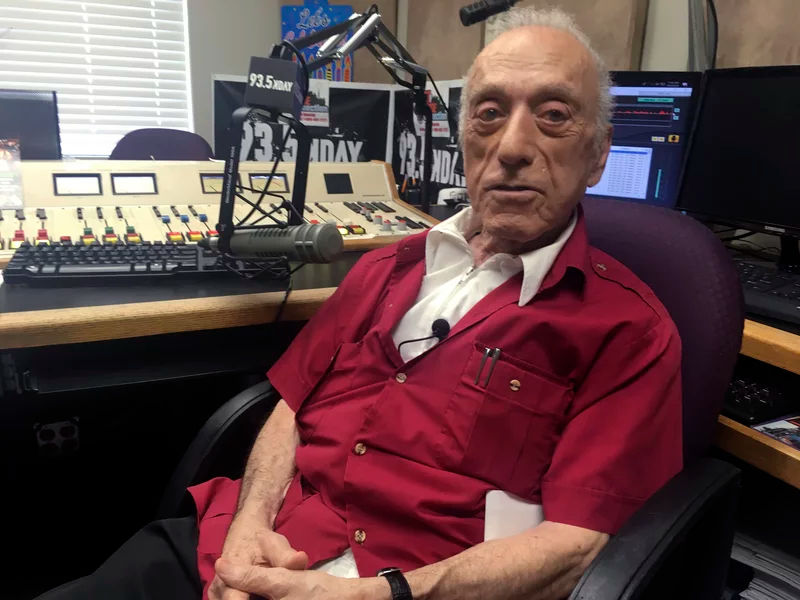
Russell Contreras/AP
Art Laboe, a pioneering DJ who is recognized with aiding in the abolition of segregation in Southern California, has passed away. He was 97.
According to Joanna Morones, a representative for Laboe’s production business, Dart Entertainment, Laboe passed away on Friday night from pneumonia.
The last episode of Laboe was produced last week and aired on Sunday night.
By planning live DJ events at drive-in restaurants that attracted whites, Blacks, and Latinos who danced to rock and roll and surprised an older generation still listening to Frank Sinatra and Big Band music, Laboe is credited with aiding in the end of segregation in Southern California.
The expression “oldies, but goodies” is also ascribed to Laboe. He founded Original Sound Record, Inc. in 1957, and in 1958 the compilation album “Oldies But Goodies: Vol. 1” was released. This record spent 183 weeks on the Billboard Top 100 list.
His baritone voice inspired listeners to phone in dedications and request a 1950s rock-n-roll love ballad or a rhythm and blues song by Alicia Keys, and he eventually gained a significant following among Mexican Americans for hosting the syndicated “The Art Laboe Connection Show.”
His radio programs offered the relatives of those who were jailed, in particular, a forum to communicate with them by dedicating music, delivering meaningful messages, and providing updates. Inmates from California and Arizona would send in their own dedications and query Laboe about news from their families.
Laboe said he was honored to portray the part.
In a 2018 interview with The Associated Press at his Palm Springs studio, Laboe stated, “I don’t judge.” “I like people,”
He frequently recalled a woman who stopped by the studio so her young child could say “Daddy, I love you” to her violently imprisoned father.
“It was the first time he had heard his baby’s voice,” Laboe said. “And this tough, hard-nosed guy burst into tears.”
The music Laboe played, according to Anthony Macias, a professor of ethnic studies at the University of California, Riverside, went with the dedications and enhanced the words. Songs like “I’m on the Outside (Looking In)” by Little Anthony & the Imperials and “Don’t Let No One Get You Down” by War, for instance, talked of tenacity and a desire to fit in.
Born Arthur Egnoian in Salt Lake City to an Armenian-American family, Laboe grew up in a Mormon home with a single mother during the Great Depression. When he was 8 years old, his sister sent him his first radio. He was engulfed by the voices and tales that emanated from it.
“And I haven’t let go since,” Laboe said.
He relocated to California, went to Stanford University, and performed military service here. When serving in the Navy during World War II, he eventually found work as a radio broadcaster at KSAN in San Francisco and changed his name to Art Laboe after a manager suggested it to seem more American.
Laboe served in the Navy when the United States joined the war. When he eventually made it back to Southern California, a radio station owner advised the would-be radio broadcaster to focus on becoming a “radio personality” instead. When Laboe worked as a DJ for KXLA in Los Angeles, he would purchase airtime and conduct live overnight music shows from drive-ins where he would encounter undiscovered rockabilly and R&B musicians. Laboe claimed, “I’ve got my own built-in research.”
He was among the first DJs in California to play rock and roll
In California, Laboe quickly rose to become one of the first DJs to play R&B and rock ‘n’ roll. Teen listeners quickly connected Laboe’s voice to the nascent rock and roll scene. By 1956, Laboe had an afternoon show and was the most popular radio show in the area. Where Laboe transmitted his show, Sunset Boulevard was clogged with cars, and marketers rushed to get a piece of the action.
Laboe was one of the select few to interview the new rockabilly star when he visited Hollywood.
The California scene that Laboe contributed to growing became one of the most diversified in the country. Much of the music Laboe played on his radio show was played in locations like the American Legion Stadium in El Monte, which helped to create a new young subculture.
Through the years, Laboe kept up a sizable fan base and evolved into a promoter of older rock-and-roll artists who never lost their appeal to Mexican Americans who loved oldies. The Rock & Roll Hall of Fame Museum in Cleveland has a permanent exhibit highlighting Laboe’s accomplishments.
After unexpectedly switching to a hip-hop format in 2015, iHeartMedia’s KHHT-FM (92.3) terminated Laboe’s syndicated oldies show, inciting irate protests in Los Angeles. Adam Vine, an essayist, wrote, “Without Art Laboe, I’m So Lonely I Could Cry.” Later that year, Laboe made a second appearance on a different station in Los Angeles.
Lalo Alcaraz, a syndicated cartoonist and television writer who grew up in San Diego and listened to Art Laboe, claimed that the DJ’s longevity among Mexican Americans was due to the fact that he consistently mixed Latino, white, and Black musicians on his shows. Alcaraz added that Laboe didn’t seem to judge his listeners who requested dedications for loved ones serving time in prison.
“Here is someone who gave a voice to the most humble of us all through music,” Alcaraz said. “He brought us together. That’s why we sought him out.”
Generations of Latino fans have reportedly attended concerts sponsored by Laboe to hear artists like Smokey Robinson, The Spinners, or Sunny & The Sunliners, according to Alex Nogales, president and CEO of the National Hispanic Media Coalition, based in Los Angeles.
“I see these really tough looking guys in the crowd. I mean, they look scary,” Nogales said. “Then Art comes out and they just melt. They love him.”


